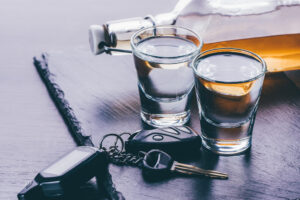
Were you arrested and charged with a DWI in Kingston, NY? The best way to defend yourself is to hire an experienced Kingston DWI lawyer. An attorney at Larkin Ingrassia Andrews Criminal Defense Attorneys, can help you fight against DWI charges and avoid a conviction. Call us at (845) 566-5345 to schedule a free consultation.
Our team is highly regarded in the Kingston area. We work around the clock to protect clients in criminal court. Every year, we handle countless DWI cases and have a proven track record of success. Contact a Kingston DWI attorney today to schedule your consultation.
How Larkin Ingrassia Andrews Criminal Defense Attorneys, Can Help if You Are Arrested for a DWI in Kingston, NY

For almost four decades, we have helped clients who were arrested for DWI in Kingston. Our law firm has received numerous recognitions, including the following:
- Super Lawyers
- National Trial Lawyers Top 100
- America’s Top 100 Lawyers
The team at Larkin Ingrassia Andrews Criminal Defense Attorneys, helps our clients through every step of the criminal court process. When representing people charged with a DWI, we will:
- Explain the charges and potential penalties
- File bond motions
- Review evidence
- Communicate with the prosecutor
- Negotiate for reduction or dismissal of charges
- File pretrial motions
- Represent you at every court hearing
- Stand up for you during trial
Most DWI cases follow a particular pattern. We can leverage our decades of experience to provide the strongest defense in your DWI case. Call us to schedule a free consultation with a Kingston criminal defense attorney today.
Overview of DWI Laws in New York
DWI stands for driving while intoxicated. Under New York law, it is illegal to operate a motor vehicle while impaired or intoxicated by drugs or alcohol.
To be impaired means that the ability to operate a motor vehicle is affected by alcohol or drugs. There is a slight difference between being impaired and being intoxicated under the law. A driver can still be impaired and have a BAC below .08. However, there is a presumption that if a driver has a .08 or higher blood alcohol content, then they are intoxicated.
Types of DWI Charges in New York
There are many different types of DWI charges in New York. Each charge carries a different set of penalties:
- First offense DWI: A first offense DWI is a misdemeanor charge. If a defendant has a prior out-of-state DUI/DWI conviction, they may be charged with a subsequent DWI instead of a first offense.
- Felony DWI: Subsequent DWIs within 10 years of the prior DWI are charged as felonies. The more prior convictions, the more serious the felony.
- Aggravated DWI: An aggravated DWI is when a driver has a BAC above .18 or is driving with a child under 15 years old in the car. It is a misdemeanor charge.
- Commercial driver’s license DWI: Commercial drivers are held to a higher standard. A CDL holder may be convicted of a DWI if their BAC is .04% or higher.
- Underage DWI: New York has a zero-tolerance law for underage DWI. If a person under 21 has a BAC of .02% or more, they can face a civil infraction. If the underage driver has a BAC of .05% to .08% or more, they could face a DWAI or DWI charge.
Understanding the different types of DWI charges in New York is crucial, as each comes with varying penalties and legal consequences.
Evidence of DWI
When police pull over someone who they suspect is drunk or impaired, their first step is to gather evidence. Strong evidence in a DWI case can include the officer’s observations, field sobriety test results, and breathalyzer or blood draw results.
Police Observations and Field Sobriety Tests
When the police pull someone over for a suspected DWI, the officer is constantly observing the suspect for signs of intoxication. Some of the most obvious signs of intoxication are:
- Slurred words
- Smell of alcohol
- Open alcohol containers
- Bloodshot eyes
- Sweating
- Stumbling
- Confusion
If the officer suspects that the driver is impaired, they will ask the driver to perform field sobriety tests. Field sobriety tests help police find probable cause to arrest someone for a DWI. There are several different types of field sobriety tests used in Kingston, including:
- Horizontal gaze nystagmus test
- One-legged stand test
- Walk-and-turn test
Field sobriety tests can produce powerful evidence of a DWI. However, they are not without faults. Many officers inaccurately administer the tests, making the results unreliable. Simply because you failed a field sobriety test doesn’t necessarily mean you will be convicted of a DWI.
Breathalyzer and Blood Tests
The strongest evidence against you in a DWI is the breathalyzer or blood test result. Most police officers have a portable breathalyzer that they can use when they pull someone over for a suspected DWI. The breathalyzer is a machine that converts the alcohol level in saliva to a BAC level. A breathalyzer can only test for alcohol and not drugs. Furthermore, breathalyzers are often inaccurate, especially if the machine is improperly calibrated.
A blood test is much more accurate than a breathalyzer test. During a blood test, a nurse will draw blood and send it to the lab. The lab will test the blood and determine the BAC. This is the hardest evidence to refute in DWI cases.
If the police ask you to take a blood or breath test, you must submit to the test. If you refuse, the refusal could be used against you in court. Furthermore, there are civil penalties, including fines and license suspensions. This rule is called implied consent and comes as a surprise to many clients. By driving on New York roads, drivers give implied consent to be tested by breath or blood for alcohol in their system.
What Are the Penalties for a DWI Conviction in Kingston?
The best outcome in your case is to avoid a conviction. However, if you are convicted, you could face the following penalties:
- First offense DWI: up to 1 year in jail, a fine of $500 – $1,000, 6-month license revocation, probation
- Aggravated DWI: up to 1 year in jail, fine of $1,000 – $2,500, 1-year license revocation
- Felony DWI: up to 7 years in prison, fine up to $10,000, 1 year license revocation
Additionally, you will have a probationary period and may need to install an ignition interlock in your car. You might also be ordered to complete substance abuse treatment.
Collateral Consequences
Every DWI conviction also has collateral consequences, especially if you are convicted of a felony. The collateral consequences may be more significant than the court-ordered penalties. Collateral consequences could include:
- Permanent criminal record
- Loss of the right to vote
- Loss of the right to own a gun
- Difficulty finding employment
- Difficulty finding housing
- Ineligibility for government assistance
You should discuss the possible collateral consequences of a conviction with your DWI attorney throughout your case.
What Defenses Can Be Raised if I Am Accused of a DWI in Kingston, NY?
DWI cases are notoriously difficult to fight. However, there are many possible defenses that you can raise to avoid a conviction. Only experienced DWI lawyers know how to leverage the defenses to achieve the best outcome for their clients.
Some of the most common defenses in DWI cases are:
- You were not intoxicated or impaired
- The breathalyzer was not properly administered or calibrated
- The field sobriety tests were unreliable
- There was an error in the blood draw or blood testing procedure
- There was no reasonable suspicion for a traffic stop
- You were not operating the motor vehicle
- There was no probable cause for the arrest
- There was another reason (such as a health issue) that presented as though you were impaired
- There is insufficient evidence
In every criminal case, the prosecution needs to prove that you are guilty beyond a reasonable doubt. This is a heavy burden, even in a DWI case. As the defendant, you aren’t obligated to produce any evidence.
A Kingston DWI lawyer will understand how to poke holes and question the evidence against you. This work will create reasonable doubt so the government cannot reach its burden of proof.
If there is favorable evidence in your case, such as eyewitness testimony or a flaw in the process, your lawyer may choose to call witnesses on your behalf. All of this work will add up to a successful defense in your case.
Contact a Kingston DWI Lawyer For a Free Consultation
Many people who are charged with a DWI in Kingston, New York, don’t realize how big of a deal it is. You should not expect that the prosecutor will go lightly on you, even if this is your first offense. The best step to take is to talk with an experienced Kingston DWI lawyer about your case. Call Larkin Ingrassia Andrews Criminal Defense Attorneys, to schedule a free consultation and learn more about how to defend yourself today.

